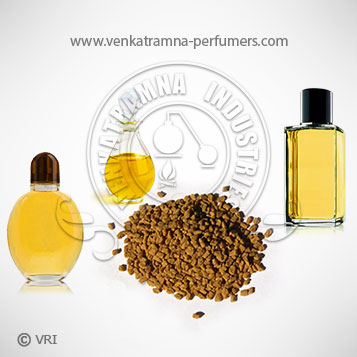
| Botanical Name | Trigonella Foenum |
| Common Name | Greek Hay and Fenigreek |
| Country of Origin | India,Italian,Swedish,Chinese |
| Solubility | soluble in alcohol, insoluble in water |
| Specific Gravity | 0.97900 to 0.98400 @ 25.00 °C |
| Optical Rotation | 10.8 |
| Refrective Index | 1.48900 to 1.49300 @ 20.00 °C |
| PlantPart | Seeds |
| Bland With | It can suitably blend with Sandalwood Oil. |
| CAS No | 68990-15-8 |
| Flash Point | 143.00 °F |
| Extraction Method | Steam Distilled |
Our range of fenugreek oil is processed from the pure extracts of seeds of fenugreeks seeds. The seeds are brownish-yellow in color and are rhombic in shape. It helps in digestion and known for soothing and relaxing inflamed tissues, relieves congestion, reduces inflammation and fights infection.
Its name is derived from the Latin foenum for Greek hay, illustrating its use in classical times as feed. Fenugreek is an ancient spice, although currently not much used in the West. It was used by the ancient Egyptians to combat fever, and later throughout the Mediterranean basin as cattle fodder. By the Middle Ages, it was being grown as a medicinal plant in India and throughout Europe, and in India it is still used in Ayurvedic medicine, and as a yellow dye
Color : Pale yellow to light brown liquid with a bitter and aromatic scent,
Aroma : Fenugreek Essential Oil has a bitter and aromatic scent. The leaves' fragrance slightly resembles lovage.
It contains iron, silicon, sodium and thiamine.
The fenugreek essential oil is widely used as an aid to digestion. It is also used as an emollient and helps in poultices for boils, cysts and other complaints. It acts as an expectorant and is beneficial for treating allergies and bronchitis.